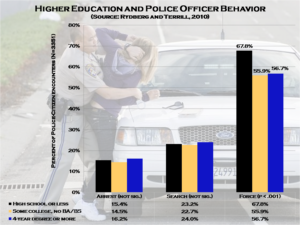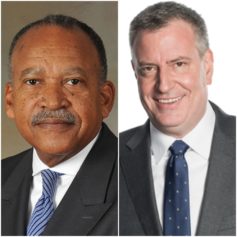As the headlines rage about police abusing and killing Black children, the nation has been posed with a serious question: What needs to be done to make law enforcement more effective and prevent more police killings of unarmed Black men?
The immediate answer for many people is to increase racial diversity, but some are suggesting that higher educational requirements for officers are just as essential if America has any hope of changing the face of its police force.
“The sad truth is that we as a society don’t expect, nor do we encourage, our best and our brightest to become police officers,” The Daily Beast columnist Keli Goff recently wrote.
Goff explained that once a person graduates from college, they are often encouraged to go into fields that offer higher rates for entry level pay and actually require a college degree in order to apply.
“I want to be clear. I am not one of those people who believe anyone with a college degree is by definition smarter than those without one,” Goff continued. “…But I also believe that having too much of the same worldview is rarely a good thing.”
Currently, a vast majority of police officers do not have college degrees and about 1 percent of police agencies in the U.S. require a four-year college degree, according to a 2013 report from the Bureau of Justice Statistics.
Multiple studies have suggested that officers with college degrees are able to perform better than other officers and were even less likely to make racially biased mistakes that other officers made, according to USA Today.
Another study cited in Police Chief Magazine indicated that officers with a four-year degree were able to perform just as well, if not better, than officers who had 10 years of additional experience.
These studies are exactly what encouraged the Plano, Texas Police Department about eight years ago to make a four-year degree a requirement for those who wished to join the force.
“An average patrol officer spends most of the time on dispute resolution,” Louis Mayo, executive director of the Police Association for College Education, told USA Today back in 2006.
Mayo added that a college education can give officers “a broad perspective that makes them much more effective.”
Many of the departments that did require college degrees in the past have been forced to change these requirements in recent years after struggling to recruit enough officers.
In 2012 the median pay reported for police officers was $56,980 a year, according to the Bureau of Labor Statistics, and this number included top ranking leadership positions that make far more than the average patrol officers.
Many departments, like the Philadelphia Police Department, reported entry-level salaries for officers that were closer to $46,000.
These salaries simply aren’t competitive enough to attract many college graduates or to convince citizens to apply for a job that requires them to put their lives on the line on a daily basis.

For one, there is no guarantee that higher pay will be enough to attract college graduates, as the Plano Police Department discovered when they still had a degree as a part of their recruiting requirements. The department lowered the educational requirements because they couldn’t seem to fill all the vacancies in the department with the higher requirements.
Then there is the issue of racial diversity and how making a college degree a requirement could drastically impact the amount of African-Americans on the police force.
With a disproportionately low amount of African Americans attending college and even fewer graduating from four-year universities, there are concerns that making a college education a requirement could whitewash police forces across the nation.
This would be particularly troublesome since police forces are already struggling with racial diversity.
Other departments have turned to incentivizing recruits to get a college education, but not making it a requirement to join the force.
The police department in Los Angeles offer recruits higher entry-level pay if they have graduated from a four-year university and offer additional bonuses for those who speak multiple languages, according to USA Today.
“Police officers need the (college) degree, not only for what it brings to individual officers and their departments but also for what the degree brings to policing,” Georgia State University criminal justice professor Robert Friedmann wrote in an essay.
For now, it seems like higher education requirements may not be a practical solution in larger cities that are faced with hundreds of vacancies every year but it could serve as a plausible part of the solution to police brutality in smaller cities.



